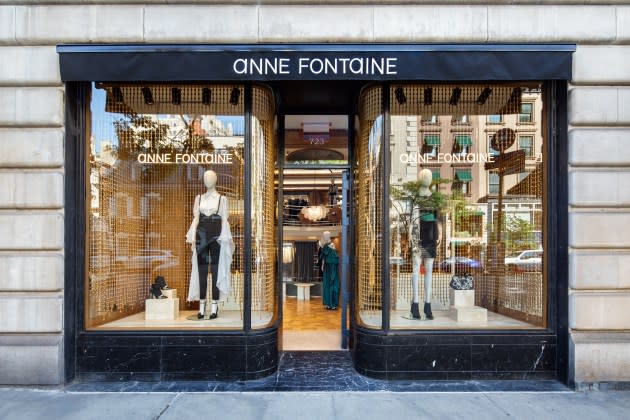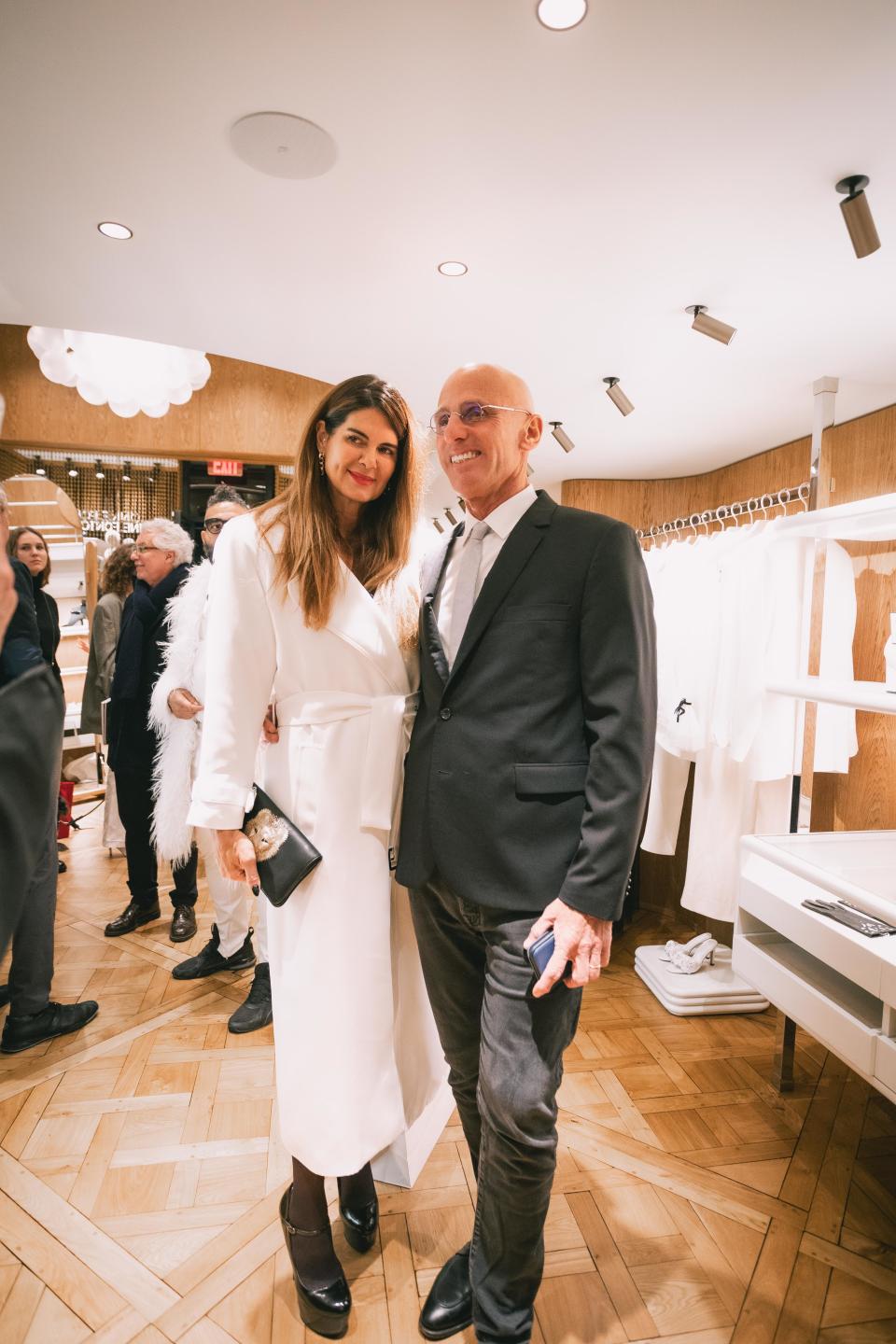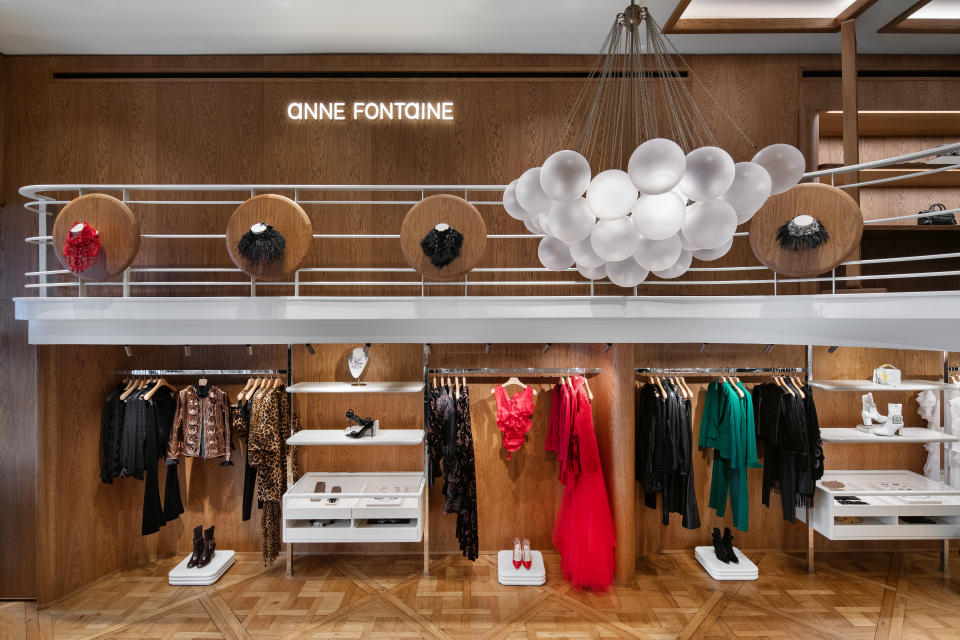Anne Fontaine Talks Expansion, Life-changing Brazilian Adventure at 17

Thirty years after starting her namesake company, Anne Fontaine was understandably reflective before Thursday night’s launch party for her Madison Avenue store.
While guests mingled in the Gabriel Kowalski-designed space, the designer and her cofounder husband Ari Zlotkin detailed future plans and one life-changing experience that left an indelible imprint on Fontaine.
More from WWD
Tiffany & Co.'s Latest Daniel Arsham Collection Features Pokémon
Burberry to Open on Avenue Montaigne, in Former Valentino Space
Like many fashion companies, sales were robust last year due to post-shutdown spending, but they have tempered a bit. Anne Fontaine expects this year’s volume to be close to last year’s tally of $60 million, Zlotkin said. Some of last year’s gains were due to opening a Monaco store, relocating stores in Florence and Zurich and a revival in sales in the company’s Paris flagship, he added, adding that the number of high-end travelers from Russia, China and the Middle East have declined in Europe, due to ongoing military and political conflicts, including the Israel-Hamas war.
While there is “a very strong base in America that is still spending,” Zlotkin said the base in Europe is “not that strong.“ However, online sales are doing well, “probably because many people are afraid to go out,” he said. The average in-store sale is about $800 or $850, whereas the average online sale is $600.
The 1,000-square-foot boutique at 723 Madison Avenue is the company’s 25th store in the U.S., and its 65th worldwide, with a Toronto store slated to open next year. The Upper East Side outpost is south of the brand’s former Madison Avenue location, which the couple said had become less trafficked due to pandemic-induced vacancies. When that lease expired and another one opened up near the Hermès store, they took advantage of the opportunity and immediately noticed an uptick in sales due to locals and tourists.

The designer’s signature white shirt continues to sell well, but there is also interest in gowns and other gala-worthy styles, she said. “People want to feel good, have some fun in life and go out wearing a nice silhouette,” Fontaine said. “I had a chance to live with an Indigenous tribe before I studied in France. The decoration of our bodies has been part of our culture for centuries,” she said, adding that tribe members change how they cut their hair and paint their bodies as a way to create a shared experience.
Building domestic sales online and in stores is a priority, since that accounts for 50 percent of the business. Along with a gala collection, the brand has diversified with handbags, shoes and other accessories.
Fontaine’s business model was centered around the white shirt, and was questioned by many, she said. Today, she’s noticed the wardrobe staple surfacing on many designer runways, and said Carolyn Bessette Kennedy is also generating interest in the trend.
“The white shirt is just back, back, back,” she said.

Born and raised in Rio de Janeiro, the designer moved to Paris as a 17-year-old to study biology and, three years later, met her husband through a mutual friend. They started a relationship and a month later, started working together.
Nature and fashion have been her two constant passions. Anne Fontaine was started in 1993 with a small shop in Paris that specialized solely in crisp white shirts that were manufactured in a factory that Slotkin’s family used. The initial plan was if-it-works-it-works, if not, that’s it, he said.
And it worked from the start.
Dressed in one of her own evening suits with a short skirt and seated on the second floor of her pristine boutique, Fontaine described her six-month stay with the Canela tribe in Amazonia. Although her mother had forbade her from taking a gap year to discover Brazil before going to school in France, she packed up a backpack, climbed out of her bedroom window to join a friend, and called her mother to apologize in advance for her Brazilian travel plans.
That experience is one of the reasons Fontaine created a foundation to help indigenous people in Brazil, who protect the Amazon, and to support reforestation in the country. She first visited a small structure where tribespeople trade goods to try to find a tribe that would allow her to live with them temporarily, and was surprised to see many people wearing soccer club shirts and drinking cachaça, she said. But an intermediary approached her about meeting his chief, who asked the then 17-year-old to come into their tribe.
I said, ‘If you are going to have a young girl eaten by crocodiles, you are going to have trouble.'”
Anne Fontaine
“It was a long process. I need to write a book about that because it was a beautiful experience,” Fontaine said, adding that living with the tribe taught her the importance of respecting people that you work with. That has carried over to how she runs her business, and the focus on creating a long-lasting, quality product that will prevent any wasted materials, she said.
To that end, the designer said she aways drapes fabrics to avoid cutting and make them reusable. Next season, Fontaine wants to create a collection made entirely of reused materials.
The mother of three daughters said she has always wanted to return to the tribe and hopes to at some point, since she had “a baptism” into the tribe.
She claims the stay became dangerous when someone began to steal the tribe’s resources and said she was abducted at one point and taken from the tribe.
While being transported by helicopter, she said she told her alleged captors that her uncle, who was a high-powered judge in Brazil, knew of her whereabouts. “I said, ‘If you are going to have a young girl eaten by crocodiles, you are going to have trouble. He already knows everything that is happening in that tribe,’” Fontaine said. “Once they put me in jail, I called my uncle and he told me that they were going to let me leave, and then you will need to disappear.”
Once released, the designer said she snuck into the back of a lumber truck, traveling for days across the Amazon.
“After that, my mom said, ‘OK, now you have to do your studies and go to Paris,’” Fontaine said.
That change in direction led to her fashion career, but the designer said she is considering writing a book or possibly a film about her Brazilian adventure.
“Do you know anyone?” she asked.
Best of WWD


